We need to stay in our own truth. Admiring experts is wonderful, but even experts can be wrong.
Sometimes it is hard to speak up when you see an expert doing something you know isn’t right with a horse. But this kind of thing has happened in all walks of life, besides horses. Because someone is an expert, we think it must be “okay.” It happens at work, where we know the boss is making a stupid decision, or treating employees unfairly, but we are not in a position to speak out without fear of losing our job. In the case of our horses, we admire the teacher, we have followed his work, and he turns out to do things and rationalize why he did it that way, and that it’s okay. You know in your gut it’s not okay, even though the teacher is world-renowned, or even renowned in a smaller way. People are singing his praises, so why aren’t you? What’s wrong with you?
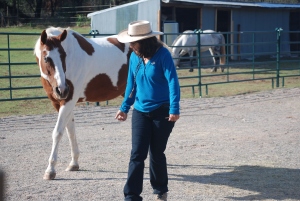 Many people have experienced this, including myself. It is best to choose to work with a trainer or teacher who embodies most of what you want to learn, and if they depart from what you had envisioned, and it doesn’t resonate with you, then it’s time to re-evaluate if this work is the best fit for you. We are all human and none of us think exactly the same way, yet we can be very close to another in our perspectives and also at times find that we are very far apart.
Many people have experienced this, including myself. It is best to choose to work with a trainer or teacher who embodies most of what you want to learn, and if they depart from what you had envisioned, and it doesn’t resonate with you, then it’s time to re-evaluate if this work is the best fit for you. We are all human and none of us think exactly the same way, yet we can be very close to another in our perspectives and also at times find that we are very far apart.
While it is valuable to stay with one methodology in order to learn it fully, it also has its risks, because then you are not only learning a method, you are learning the instructor’s interpretation of that work. If you are working for the instructor in some capacity, this could be a problem if you disagree strongly with the way things are going.
The best teachers are those who are open to hearing their students’ concerns, and who might find a way to nourish what the student needs. Very intuitive teachers will know what the student needs next, without overpowering them with their “knowing.” Another important way is to truly hear the student and ask questions, what will feel right to you in your learning? Someone who is really intuitive and pays attention to both the horse and the owner, will be the best kind of teacher. The horse/owner horse/rider combination is symbiotic and you can’t address one without the other.
Very often the horse will have physical or emotional concerns that can impact the lesson hugely if the horse’s limitations aren’t taken into consideration. I’m particularly sensitive to the trainer who will say, “Work the horse through his restriction.” Most recently I heard a trainer say, “let’s start working on the side that’s most difficult for the horse rather than the easy side.” How would you like to be approached on the side where you have most restriction?
My experience with this is from a bodywork point of view: if I work a horse on the side that is most accessible, very often the difficult side will soften and be easier for him once we get there. And if it’s too hard, we don’t have to go there today.
For the rider, it can be similar. The trainer wants you to place your legs or feet a certain way, usually it is “feet forward, not out to the side.” For some people, this might be difficult to impossible, depending upon their structure or past injuries! This means you’re bending your ankle or leg in a way it isn’t comfortable going. Some riders have reported working with a trainer who puts them “in the position.” The result has been pain, pain, pain! Why do you want to be in pain while riding? Isn’t the objective to have fun?
Another one: “The horse has all day to stand around doing what he wants, so when I get him out, he better be ready to do what I want.” Geez. Might you at least ask how his day is going so far?
Watch out for the trainer who may speak the same way he has always spoken, but then do the opposite, like a “wolf in sheep’s clothing,” maybe. Words can be cheap, and if an instructor once had an idealogy that worked, and the words speak to people, they can conceivably continue to speak this way while introducing contradictory material. It’s something to beware of. It is so important to really get an energetic sense of the person you have chosen to study with, to know whether their words match their actions.
By no means am I suggesting that we don’t listen to anyone, that could be equally dangerous. Just remain alert for those things that sound an alarm bell somewhere deep inside. Be true to yourself…and your horse.
Think about how many times per day your beliefs are challenged. Vitamin C, for example, which was touted as a vitamin to help with treating colds and other respiratory illnesses, is lambasted every so often as “ineffective” by various studies coming out of notable medical institutions such as Stanford and the Mayo Clinic. These are experts doing these studies. So how could something that has worked so well suddenly be found to be ineffective? Why do we get this constant barrage of messages saying that this or that is not good for you, or is now good for you? My recent favorite was the study on coffee, saying that coffee has been found to be very good for you. Coffee has a high caffeine rate and generally speaking isn’t very good for you because caffeine isn’t good for your bones, for one thing. If you have arthritis, you shouldn’t drink coffee. It is also a diuretic. You can’t negate all the other bad things it does for your body by this one controlled study.
One thing is true: horses do not read these studies. They also do not hear or read the marketing materials of the various trainers who are out there. They hear their voices but it is actions that speak louder than words to them, and more so than that, it is energy that speaks the loudest. Horses know people who can make things happen: trainers who can get things done, and they will respond with respect or loathing to these people. To a large degree, trainers need to be results-driven because they’re being paid to get results, show some significant change. Horses will make changes through repetitious work, round penning, longing, many activities that are customary procedures for horse training. It is not really the techniques, it is the essence of the person conducting them that matters. But when horses encounter someone with true calling and confidence, their eyes may grow soft and curious, and they will want to do the things suggested because it seems like a good idea and there is no force involved. They feel a sense of freedom.
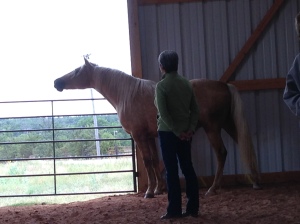
Unfortunately, the phrase “My trainer says” has become synonymous with “my doctor says” for the horse world. Even people who have been around horses a long time and have lots of experience can find themselves afraid to speak up and possibly disagree with the trainer. It doesn’t matter who the trainer studied with, what their credentials are, the horse will make the ultimate decision. The horse knows the truth; he is the most honest being there is. If your horses do not want to engage with the trainer, listen to what they might have to say. I’ve seen them turn away, disinterested, feeling something much deeper than anything we can feel, or maybe we don’t want to feel it because we have high hopes for the person and we’ve invested money in them.
Humans have a remarkable ability to not listen to their intuition, and that is one thing that makes us different from horses. Our intuition, our personal truth, can save our lives. I know the times that I have not listened to my intuition, things have not gone as I would’ve liked. Sometimes the results have been disastrous. The other thing we do that is very un-horse-like is rationalize our actions. We rationalize it to make it feel better to ourselves. That is so foreign to the horse mentality; he can easily walk away from us when we do this. If you find yourself beginning to rationalize something you’re doing with your horse, stop what you’re doing and be quiet. Think about what you’re doing.
You can pretend you are relaxed when you aren’t and the horse will know it. Your best bet is to seek to center yourself through some means, like meditation or dimensional work, so that you can be in your true strength around horses. I believe that people have the ability to change through their relationship with horses, that horses can show us things that we could not find on our own otherwise, or maybe it would take us a lot longer through some other avenue. The lessons horses have to share with us are so pointed, so real, that we can’t wiggle out of knowing it, unless we are really dull to it. I don’t know how many times I have been humbled by the lesson of a horse, and each time I want to bow and say a blessing for what they have taken the time to teach me.
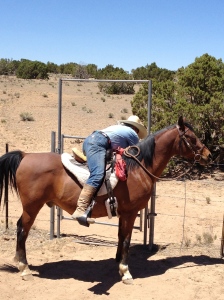
I don’t mean that we rely on horses to make decisions for us and/or burden them with our emotions and problems; not “equine assisted therapies,” another topic entirely, but rather, an opening, an enlightenment that you find in yourself, clear yourself of the debris that comes with being human on a regular basis. With that comes growing confidence in what you have to offer, and what choices are best for you and our horses.
On the other hand, we humans have the type of intellect that allows us to make plans, to come up with activities, to hold a vision of the future and what we would like to accomplish with a horse. The horse has very simple goals – food and territory, so if we stayed just with their goals, we wouldn’t get very far. However, we can make use of what they are interested in and show genuine interest in those goals too, in order to build a relationship established in trust, where we can then introduce our plans and invite the horses to become active and joyous participants in what we have in mind. I do believe horses can enjoy their work.
Because horses are so honest, and do not rationalize, they can provide a metaphor for life. A good leader is not a dictator, but someone who is honest, stays in their own truth and does not rationalize poor decision-making. A good leader is a good caretaker.
Related posts:
I just got my horse back from the trainer and…
Services: Bodywork (Ortho-Bionomy for people, Equine Positional Release/Equine Ortho-Bionomy): private sessions (including Horse & Rider sessions), tutorials, phone consultations, distance healing communication and gift certificates
Liberty Training: clinics, mini-clinics, workshops, private and semi-private sessions, tutorials, consultations: by appointment: 505.501.2478 or emailing susansmith@orthohorse.info Fall Lessons – semi-private, private and small group sessions. Scheduling now. Contact me for details.
New on the schedule for 2014:
January 18, 2014, OrthoHorse Tutorial – Arrowhead Ranch, Santa Fe, Susan Smith, Advanced Registered Practitioner Ortho-Bionomy 9:30 a.m.-12:30 p.m.
March 1-2 Horses at Liberty Foundation Training Weekend Clinic, DeLand, Florida. Contact Anne Daimler, tdaimler@cfl.rr.com (386-822-4564) or myself for registration and information. Space is limited. OrthoHorse Tutorial also offered before the clinic: February 28 (see flyers below). An afternoon Tutorial may be offered by popular demand.
April 5-6 Spirit Horse Ranch Liberty Foundations Clinic, Jones Oklahoma, Presented by trainers Ruella Yates and Susan Smith. Contact Ruella Yates ruella@libertyfoundations.com, (405-771-4274) or myself for registration and information. Space is limited.
More OrthoHorse Tutorials and Horses at Liberty Foundation Training Clinics will be offered on the 2014 schedule. Copyright (c) Susan Smith, OrthoHorse, Horses at Liberty Foundation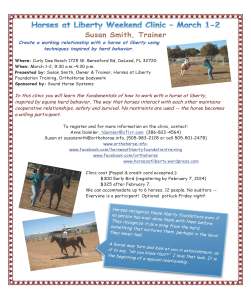 Training
Training 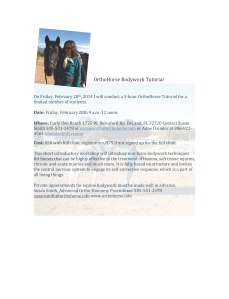



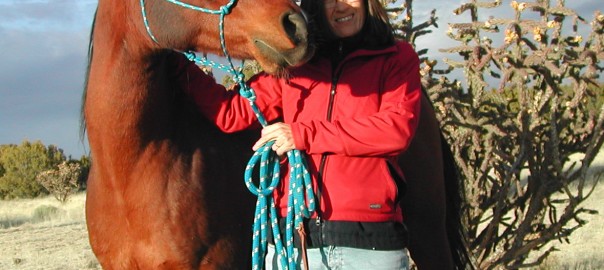
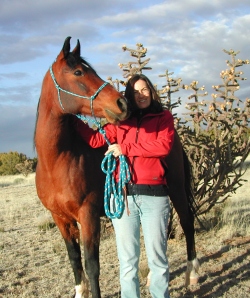
Lovely article on something that needed to be said. And yes, such a wonderful metaphor for life in general! Thank you, Susan,
Wonderful post, Susan. This one rings true for so many of us who have felt that a trainer didn’t really know their horse, ‘pushing them through’ inappropriate things. Trust your horse, believe your horse, ‘be true to your horse.’